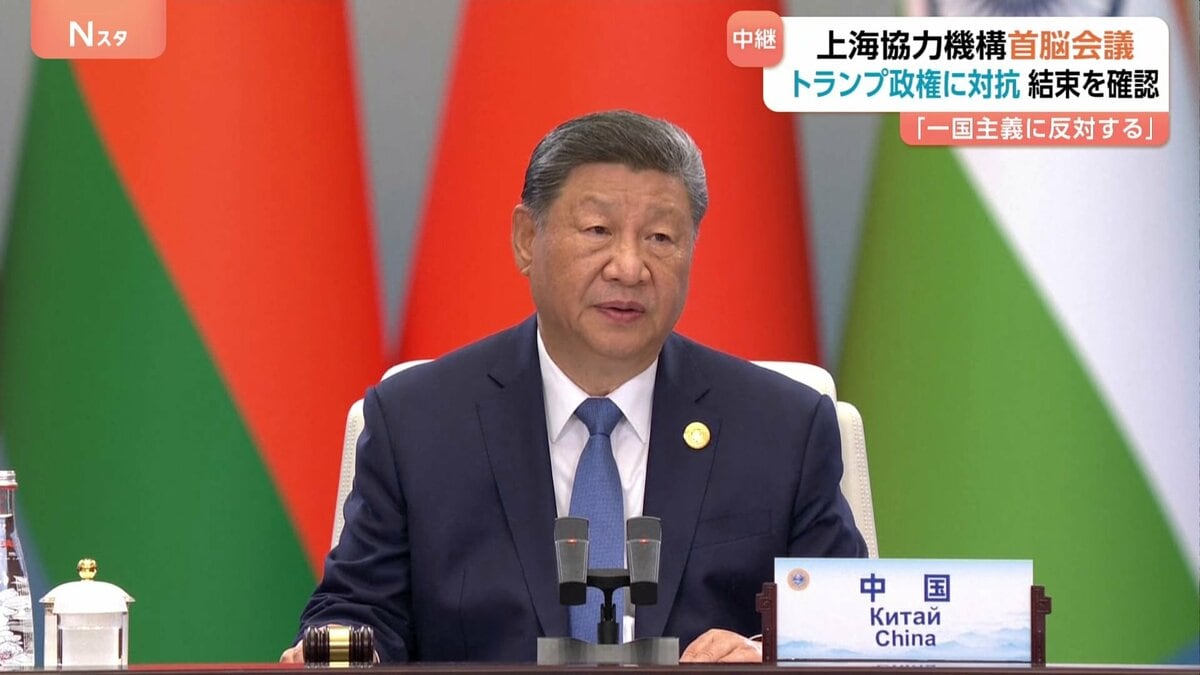Leaders from over 20 countries attended the Shanghai Cooperation Organisation summit held in China. What message is China aiming to convey through this summit and the ongoing diplomatic engagements with leaders in the coming days?
In his concluding speech at the summit, President Xi Jinping stated, “We oppose unilateralism.”
Throughout the summit, China’s message consistently reflected a strong awareness of the Trump administration’s emphasis on “America First” and protectionism.
Although the summit concludes today, China’s diplomatic engagements with world leaders will continue tomorrow and beyond.
Another meeting between President Xi and President Putin is expected tomorrow, and a possible meeting with Chairman Kim Jong Un, who will attend the military parade the day after, is also anticipated.
China, considering the potential for prolonged confrontation with the United States, aims to strengthen solidarity with these countries and counter the U.S.
Shanghai Cooperation Organisation
The Shanghai Cooperation Organisation (SCO) is a Eurasian political, economic, and security alliance founded in 2001 by the leaders of China, Russia, Kazakhstan, Kyrgyzstan, Tajikistan, and Uzbekistan. It evolved from the “Shanghai Five” mechanism, which was established in 1996 to resolve border disputes and build trust following the dissolution of the Soviet Union. Today, it is one of the world’s largest regional organizations, focusing on mutual security and economic cooperation.
China
China is a country with one of the world’s oldest continuous civilizations, dating back over four millennia. Its long history is marked by a succession of powerful dynasties and the development of influential philosophical traditions like Confucianism. Today, it is a modern nation that preserves a vast number of cultural sites, including the Great Wall and the Forbidden City, which stand as monuments to its imperial past.
Trump administration
The Trump administration refers to the U.S. executive branch under President Donald J. Trump from 2017 to 2021. It was a historically unconventional presidency marked by a populist “America First” agenda, significant tax reforms, and major diplomatic shifts in trade and foreign policy. Its tenure was also defined by high political polarization and concluded with the Capitol riot on January 6, 2021.
America First
“America First” is not a physical place or cultural site, but a political slogan and policy approach. It has been used at various points in U.S. history, most notably as an isolationist foreign policy stance before World War II and more recently as a central theme of a presidential administration. The phrase advocates for prioritizing American interests in economic and diplomatic matters.
President Xi Jinping
“President Xi Jinping” refers to the leader of the People’s Republic of China, not a place or cultural site. He has served as the General Secretary of the Communist Party of China since 2012 and as the President of China since 2013, playing a central role in the country’s contemporary governance and policy direction.
President Putin
“President Putin” refers to Vladimir Putin, a political leader rather than a place or cultural site. He has served as either President or Prime Minister of Russia since 1999, a period marked by centralized power and significant geopolitical events. His leadership has profoundly shaped modern Russia’s domestic policies and international relations.
Chairman Kim Jong Un
“Chairman Kim Jong Un” is the title for the leader of North Korea, not a place or cultural site. He is the third generation of his family to rule the country, having assumed power in 2011 following the death of his father, Kim Jong Il. His leadership continues the state’s ideology of Juche (self-reliance) and the development of its nuclear weapons program.
United States
The United States is a federal republic founded in 1776 after declaring independence from Great Britain. Its history is marked by westward expansion, a civil war over slavery, and its emergence as a global superpower in the 20th century. Culturally, it is a diverse nation of immigrants, known for its significant global influence in media, technology, and democratic ideals.






